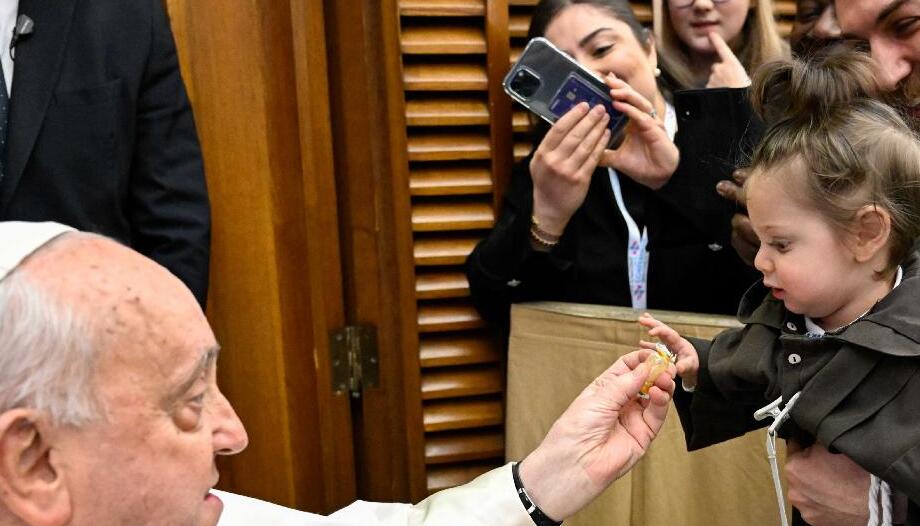With a cold that prevented him from delivering the catechesis, having to leave the speech to an official of the Secretary of State, Pier Luigi Giroli, Pope Francis has resumed in the Audience This Wednesday the theme that will be developed throughout the Jubilee Year, 'Jesus Christ, our hope'. The reflection was based on the Gospel of St. Luke (1:39-42), with the title: "And blessed is she who believed" (Lk 1:45).
In a Paul VI Hall packed with pilgrims, the Pope's meditation focused on the Visitation of Our Lady to her cousin St. Elizabeth, the second joyful mystery of the Rosarioand in the Magnificat.
The Pontiff encouraged us to ask today "the Lord for the grace to know how to wait for the fulfillment of all his promises; and may he help us to welcome Mary's presence in our lives. By placing ourselves in her school, may we all discover that every soul that believes and hopes 'conceives and begets the Word of God' (St. Ambrose, Exposition of the Gospel according to St. Luke 2:26)".
For priests and consecrated men and women, and for the displaced people of Palestine
In his greeting to the Polish pilgrims, the Pope encouraged them "to pray for priests and consecrated men and women who carry out their ministry in poor countries, and to pray for the priests and consecrated men and women who work in the poorest countries of the world. war-tornespecially in Ukraine, the Middle East and the Democratic Republic of Congo. For many, this presence is proof that God always remembers them".
At the end, addressing the pilgrims in Italian, Francis again asked for prayers for "the martyred Ukraine, Israel, Jordan, so many countries that are suffering, and for the displaced people of Palestine. Let us pray for them," he prayed.
Requests to pilgrims
The Successor of Peter asked the French-speaking pilgrims to "follow the school of Mary, cultivating a heart open to God and to our brothers and sisters"; to the English-speaking pilgrims, his wish that "the Jubilee be for you an occasion of spiritual renewal and growth in the joy of the Gospel"; to the English-speaking pilgrims, his wish that "the Jubilee be for you an occasion of spiritual renewal and growth in the joy of the Gospel"; To the German-speaking faithful, "may we too bring Christ to the men and women of our time"; to the Spanish-speaking faithful, who, like the Poles, made their presence felt, he asked them to "raise to God the song of the Magnificat, like Mary, recalling with gratitude the great things he has done in our lives".
The Pontiff exhorted the Chinese-speakers to "always be builders of peace"; the Portuguese-speakers to "learn from her the availability to serve those in need"; and the Arabs to "bear witness to the Gospel in order to build a new world with meekness, through the gifts and charisms they have received".
Adherence to Christ while visiting the tombs of the Apostles
Before praying the Our Father and giving the final blessing, the Pope personally read two other prayers. First, "I hope that the visit to the tombs of the Apostles will inspire a renewed desire for adherence to Christ and Christian witness in your communities.
In conclusion, he said: "As the Apostle Paul exhorts us, I urge you to be joyful in hope, strong in tribulation, persevering in prayer, and attentive to the needs of your brethren (cf. Rom 12:12-13).
Mary, the impulse of love
In his catechesis, and using the Virgin Mary as an example, the Pope encouraged the following go out to meet of others. "This young daughter of Israel does not choose to protect herself from the world, she does not fear the dangers and judgments of others, but goes out to meet others. When a person feels loved, she experiences a force that sets love in motion; as the Apostle Paul says, 'the love of Christ possesses us' (2Co 5:14), it impels us, it moves us."
"Maria She feels the impulse of love and goes to help a woman who is a relative of hers, but also an elderly woman who, after a long wait, welcomes an unexpected pregnancy, difficult to cope with at her age. But Our Lady also goes to Elizabeth to share her faith in the God of the impossible and her hope in the fulfillment of his promises".
The Magnificat
The massive presence of the Easter motif, the Holy Father commented, "also makes of the Magnificat a song of redemption, which has as its background the memory of Israel's liberation from Egypt. The verbs are all in the past tense, impregnated with a memory of love that enkindles the present with faith and illuminates the future with hope: Mary sings the grace of the past, but she is the woman of the present who carries the future in her womb".








